Heavy Medal Mock Newbery Finalist: EB & FLOW by Kelly J. Baptist

Introduction by Heavy Medal Award Committee Member Michelle Lettus:
Eb and Flow got into a fight and now they have ten days of suspension to think about what happened. To Eb, Flow overreacted when she accidentally scuffed up his shoes and he called her a bad name. She can’t just let that go so she slaps Flow. This will be her eighth time being suspended for fighting. To Flow, those sneakers were a special gift from someone important and Eb just went and ruined them. He wasn’t the one who called Eb any names so when she slaps him, his anger just takes over and he hits her back. No one is more shocked than Flow.
What Baptist has done well is she has created two characters who do have some things in common but are also extremely different. In a different book, the punishment for fighting would have been to spend time and learn about each other. However, Eb & Flow spend little time together throughout the story, and as a reader, you may wonder how these two are ever going to resolve their differences. It’s realistic that after being suspended, they will not see each other. They are not friends and do not have friends in common. Eb & Flow grow individually as they deal with their families’ disappointment, and friends’ opinions, and reflect on what happened. Flow has a lot to lose by getting suspended. He wants to go to a school with a swim team, but he needs to have good grades and stay out of trouble. Eb is lost and keeps getting into fights. The adults in her life are all overwhelmed or not around, and she is on her own.
ADVERTISEMENT
ADVERTISEMENT
The side characters play an important role. Eb’s mom is not around, and her dad is in the military, so she lives with her grandmother, sisters, brother, nephew, and sometimes her cousin. Eb’s grandmother grows as a character when she finally puts her foot down with her family. Flow lives with his mom and sister who he loves. His father is away in the military and is an important figure in Flow’s life. Flow’s uncle is an important figure in the family. His brother doesn’t live with them. Eb and Flow’s friends also influence them in positive and negative ways. Baptist does a great job of showing how who you are around can impact what you think and believe.
Heavy Medal Award Committee members and others are now invited to discuss this book further in the Comments section below. Let the Mock Newbery discussion begin!
Filed under: Book Discussion, Heavy Medal Mock
About Steven Engelfried
Steven Engelfried was the Library Services Manager at the Wilsonville Public Library in Oregon until he retired in 2022 after 35 years as a full-time librarian. He served on the 2010 Newbery committee, chaired the 2013 Newbery Committee, and also served on the 2002 Caldecott committee. You can reach him at sengelfried@yahoo.com.
ADVERTISEMENT
ADVERTISEMENT
SLJ Blog Network
Name That LEGO Book Cover! (#53)
Cover Reveal and Q&A: The One and Only Googoosh with Azadeh Westergaard
Exclusive: Vol. 2 of The Weirn Books Is Coming in October | News
Fighting Public School Book Bans with the Civil Rights Act
Take Five: Middle Grade Anthologies and Short Story Collections
ADVERTISEMENT



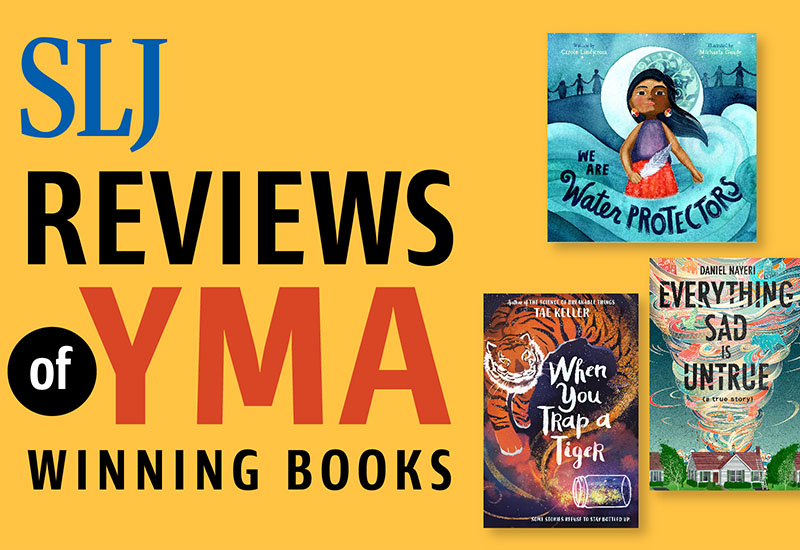
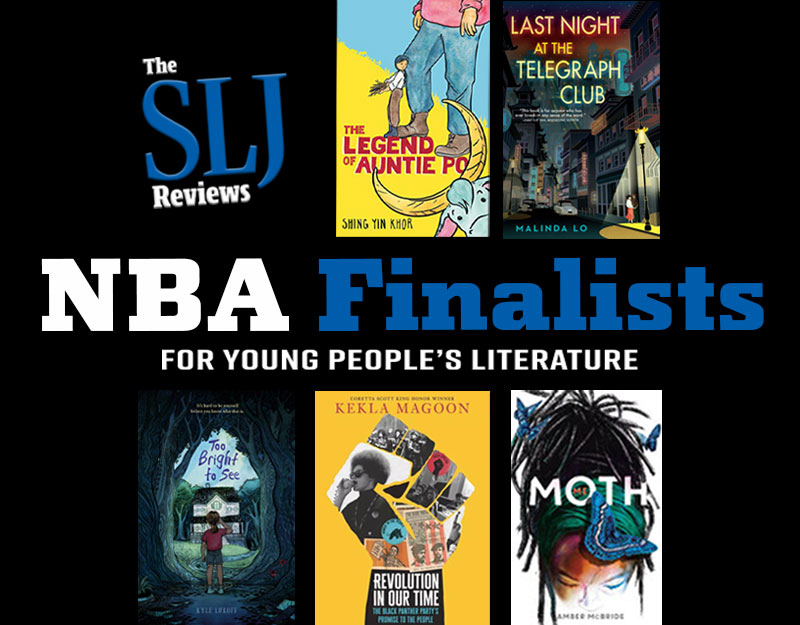
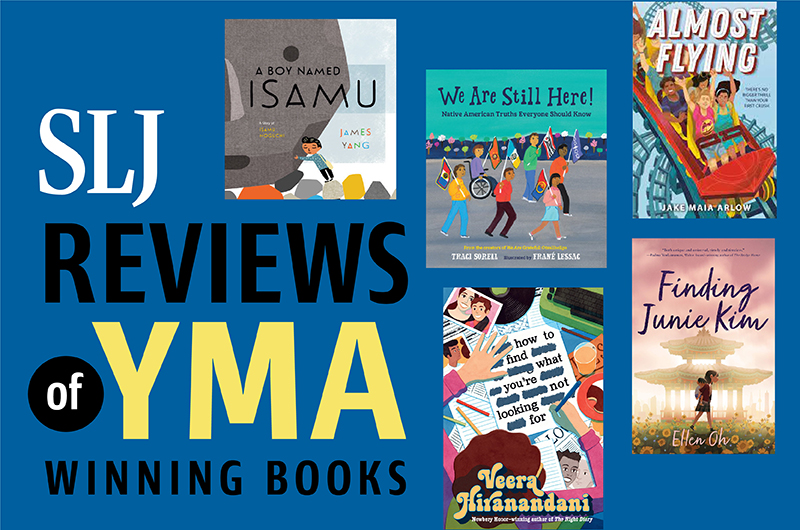
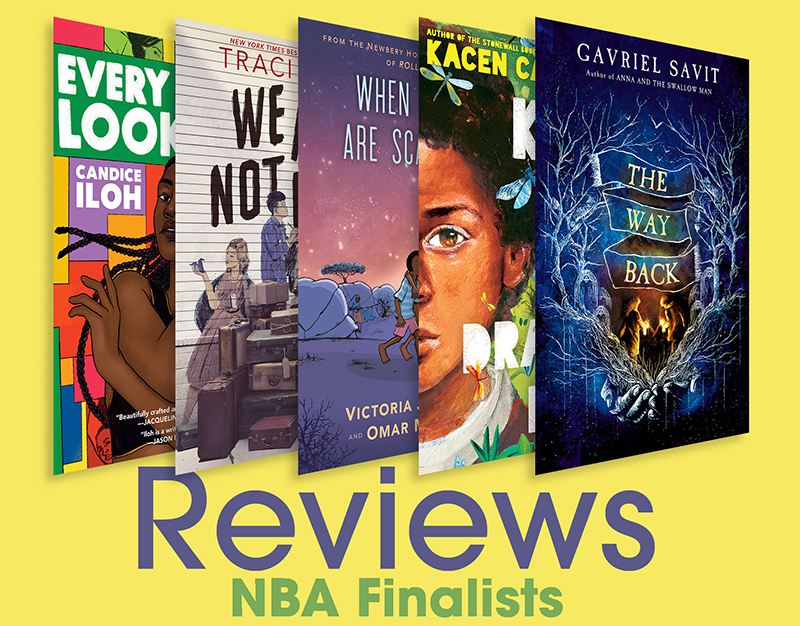
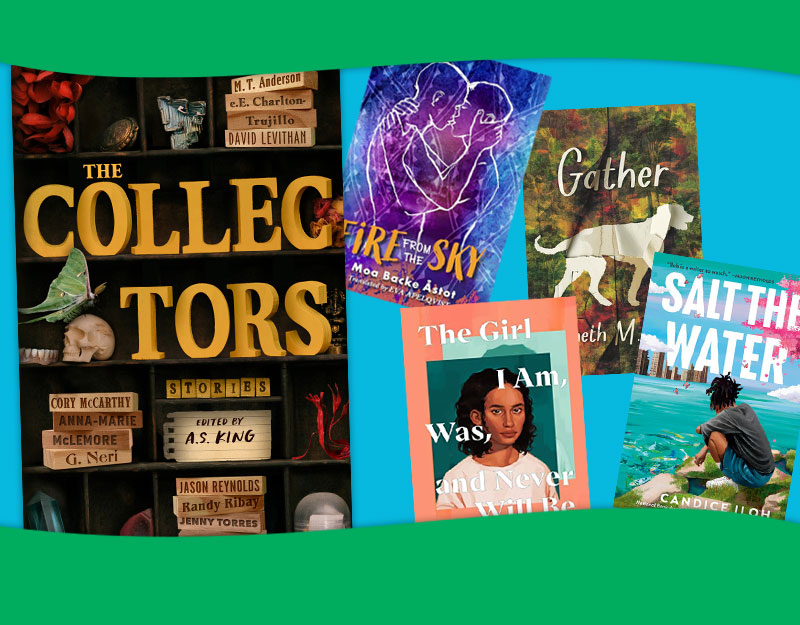
I think the verse in this one helps it stand out to me–I remember reviewing this one for a magazine, and I enjoyed the way the verse was unique to each of their voices, which helped the characterization.
I’m very conflicted on how I feel about this book and how it will translate with readers. Usually I love novels in verse but personally, I occasionally had trouble keep tracking of who was Eb and who was Flow (and yes the verse style was unique). So for me, I feel it is lacking within the delineation of characters.
I do think the book suffers from the lack of interaction between the main characters as well. The plot and setting are easily recognizable but I found myself wanting more.
This was the first of the finalists I read, and it ended up in my top 3 now that I’ve finished the list. One aspect I liked of the book was that there were places where it seemed like a cliched plot point was being set up, but Baptist took things in more interesting directions instead. In the opening, when Flow says he doesn’t hit girls, it seemed like this could have been just some misunderstanding where he was only rumored to have hit Ebony, or accidentally hit her, but no – he did hit her. Ebony and Flow both make bad decisions at different points throughout the book, in some cases decisions they know are bad at the time, but Baptist is a good enough writer to make us understand why they did it, and it turns the good decisions they make into real character development.
Another example: on the final day of the suspension that they have to serve in school together, with an instructor who wants them to make up with each other – we’ve all seen stories where enemies come to some revelation when thrown together and they walk out best friends. Eb and Flow do both grow, but the distance they close is just a small first step or two in the end. But that’s more realistic, and more satisfying than the saccharine version.
With that said, there is the “it was all a dream” chapter near the end, which is not a cliche that I usually like (we’ll get to GONE WOLF in a couple days…), but Baptist at least set it off with distinct typography to signal that something unusual was going on. I think it ended up working well.
Like I said, this was one of my favorites this year.
Thoughts on Free Verse in Eb and Flow (corrected)
In EB AND FLOW, Kelly J. Baptist writes in a free-verse style of poetry throughout the entire novel.
2023 was a great year for free verse poetry, and I expect even more in 2024.
I just was frustrated through most of this book. I liked the idea of the characters in conflict because it made room for tension and plot, but I kept hoping they would own their mistakes. They never got there, so their characterization fell short for me. I get they were their own, and many kids can relate to that, but I wanted to see some hero journey emerge in the plot.
I liked that their stories were independent and that both kids’ perspectives were examined. It’s also creative that there was no resolution, but in a story about fighting and bullying (which I think is madcap and never ok,) I wished for a didactic coming-of-age reflection that showed growth. Maybe I just don’t get it. Was it a good book? Yes. I loved the descriptions of swimming, and creativity kept me interested. It has generated award buzz for 2023, but I need help getting there. Maybe I just don’t get it. Was it a good book? Yes. I loved the descriptions of swimming, and creativity kept me interested, just outside the Newbery Medal category.
I like poetry. In particular, I love the free-verse poetry of Jason Reynolds and Kwame Alexander. HARBORING HOPE was a great collection of different poetry forms, from free verse to concrete poems. I wanted to compare EBB and FLOW’s use of language. So, I looked for a source to help with my argument.
Sean Glatch from Writers.com (https://writers.com/how-to-write-a-free-verse-poem) defines free verse as “a poem that doesn’t rely on any particular form, meter, or rhyme scheme, yet still conveys powerful feelings and ideas.” The powerful feelings and ideas are what I was looking for in EBB AND FLOW. There were feelings but no satisfying resolution for me with EBB AND FLOW. While I understand the choice to write in free verse, the story plot may have had more power in a novel.
In comparison, A SONG OF US is an example of an incredibly written free verse novel. It was emotional, descriptive, and novel in its theme- a necessary achievement outlined in Newbery rubrics. The story of their estranged love and conflicts is enhanced with superb free verse poetry, painting a masterpiece of emotion and feelings, drawing the reader and making them feel the pain and love the characters go through. A SONG OF US is my top free verse poetry for 2024 in terms of characters, plot, theme, and language (poetry).
But let’s look at Newbery history as a standard. I seek a bold plot, theme, language, and characterization to earn a medal. As a young reader, I am most satisfied with an engaging plot (a well-executed plot twist is fun,) conflict resolution, and a satisfying story ending. As a youth reviewer, I am looking for a book that is a personal favorite, a children’s favorite, and has the highest literary quality. It’s what I keep looking for in debating the decades’ polls. The best example of this is THE CROSSOVER (2015). The upper end of the Newbery Range of 10-14 WHEN YOU REACH ME (2010) is also a triple threat.
(https://heavymedal.slj.com/2023/10/27/debating-decades-a-new-poll-for-the-2000s-plus-results-of-the-2010s-poll/
That’s my real challenge to HMAC and the Newbery Committee. In the sea of great books, find the triple threat.
Quade your posts are VERY thought provoking. I’m also agreeing with you one hundred percent. For me as well…I need help getting this to a Newbery winner. Is it good? Yes. But I wanted more resolution. I wanted more feels. Additionally, and this is no fault of Kelly J. Baptist, I was comparing free verse to Kwame Alexander and Jason Reynolds and their award winnings works. Eb and Flow, to me, did not measure up to THE CROSSOVER, LONG WAY DOWN, etc.
Sorry for title spelling errors.
I thought the lack of a tidy resolution was one of the book’s strengths. We do see the characters mature and grow, but we don’t get an unrealistic miracle of friendship.
We also get to see a very realistic ending in the dream sequence that is walked back in a way that is appropriate for children—that part reminded me a bit of ECHO where the cliffhangers hinted that something terrible was about to happen, but then it turned out okay, as children’s books typically do.
For the children who do get in trouble at school, this book will be a great mirror and will let them feel seen in children’s literature. For children who don’t get in trouble at school, the strong delineation of character will help them empathize and see that there’s more to the story of the “troublemaker” kids.
Finally, I wonder if viewing this book’s poetic style in reference to jazz would be helpful. Jazz music can be very complex, but it doesn’t necessarily resolve. Likewise, Ebony and Flow’s story was skillfully drawn and the author handled an intense plot with grace and care even if everything wasn’t neatly wrapped up.
Rae, I am 100% going to check out jazz. Cool idea.
I agree Rae! I didn’t like that the ending was so open-ended. I wanted to see what happened to Ty’ree, or Ebony’s pregnant sister. I wanted to see what kind of friendship Ebony and Flow would have. Would Flow really pursue swimming? Would Ebony go to live with her father? SO many questions! I thought the strongest criteria for Eb and Flow were the characters and the style of writing. I really enjoy novels in verse, and I read this in one sitting. It’s a strong read, but I just wanted more from it.
Late to this party, but I also think the lack of resolution is this book’s greatest strength. We have to remember that this story takes place over the course of ten days. While it’s usually the stuff of Newbery titles for a protagonist to have a sudden heroic journey after a single event, it’s much more realistic for middle schoolers to “sort of” own up to their mistakes. So I thought the conclusion we did get showed a promising step for Eb and Flow.
While it’s not my favorite of the bunch, I do think Eb and Flow meets all the Newbery criteria. It’s distinguished by its realistic conclusion and its accessible style (I worked with youth on probation for 4 years, many of whom were reluctant readers, and would definitely add this to their classroom library). Thematically, it’s meaningful, and universal, with a simple message that can be discussed in classrooms and at home: you don’t have to know everything that someone is going through to take the first step toward an apology. The story is clearly organized and I would argue that the characters are pretty clearly delineated. As others have mentioned, the setting is also an authentic one that will be familiar to many readers. Even the plot is compelling; Eb and Flow have to contend with so much during the ten days that theoretically should be uneventful for them! I was invested in their lives and relationships throughout the story, asking: will Flow ever get to live his swim team dreams? will Eb’s relationship with her mom improve? is trouble going to come to Flow’s brother? what will Eb’s cousin do to Flow!?
I agree with Brian, the aspect that I liked the most about this book was that Baptist did not take the direction of a cliched plot of Eb & Flow owning up to their mistakes and becoming friends. Instead Baptist showed the depth and complexity of the protagonists dealing with their own inner conflicts of how do you fight your own instincts when inside yourself you are holding back your anger for all the injustices in your life and the world.
Baptist’s use of authentic language,tone and alternating narratives was highly effective. The way Baptist gradually revealed the details of the fight and gradually showed revelations of both Eb & Flow’s lives and neighborhood made me see their motivations for why they fought, but also made me feel empathetic toward both characters. Her skillful writing helped me to reflect on how I might control my own anger if I lived in their unjust situations. Baptist explored the theme of the effects on kids that deal with gang violence, inequitable schools, absent parents, complicated home situations and injustices in a realistic way and showed that there are not easy answers.
When I started reading this book, I couldn’t put it down. All the while reading, I wondered if the protagonists would be able to stay out of another fight, and I felt the characters were trying to figure out how to stay out of a fight too, as that’s the only way they knew how to deal with their emotions. Then on top of that tension Baptist adds a twist to the story, that I was not expecting. Wow, what a skillful writer.
This book is strong in theme, delineation of characters & setting and has an engaging plot with tension and a twist. The writing is exceptional, Baptist did not take the easy route out showing the complexities of social injustice and I appreciated that.
I loved this book.
Contemporary realistic novels aren’t usually praised for their world building but as someone who works in a neighborhood that’s very similar to Brookside, I was impressed with how Baptist captured the essence of the place and people through language (nailed the texting/chat conventions!), greetings (“giving me dap”), and details like a man from church plowing Granny’s driveway. Rox Anne used the word “authentic” and I couldn’t agree more.
I first experienced EB AND FLOW book on audio over the summer with two excellent narrators. Sometimes, excellent narrators can make a story more impressive through the power of their performance (we’ve all seen terrible movies carried by the charisma of a lead actor). However, while re-reading as a text, I still found their voices distinct and appreciated the typographical choices and line breaks all the more for their emphasis and meaning. I don’t agree that the story would have been more effective in prose – this story is meant to be a microcosm, the scale intentionally small and focused.
One note I’ll make about having read the dream sequence twice – in audio it was much more jarring without the physical cues of italics to suggest that the events weren’t really happening.
I appreciated that Eb and Flow didn’t interact more. Readers are supposed to see that the two are not polar opposites, with one kid in the right and one in the wrong. Ebony and De’Kari are two kids from the same neighborhood who should understand each other on a profoundly personal level. In fact, the novel goes out of its way to highlight their similarities, especially after the turning point halfway with the snow day. From there (page 99 – onward), Eb and Flow are practically in lock-step with each other, from making ramen for lunch and chili for dinner (108-109, 113, 116), rare and special phone calls with their dads (128, 132), pizza (146 and 147), older siblings taking care of their hair with Cas at the barber and Poke braiding (152, 154) where Ebony and Flow both learn of larger gossip swirling before they cross paths again in ISS with Mrs. Rashad, swapping doritos at lunch.
Like Brian and Rae, I found the conclusion satisfying – having witnessed a realistic amount of growth in 10 days for Flow and Ebony, the novel ends on a hopeful note with “Day One” after their apology to each other. And I suspect child readers will appreciate that it’s not a “grown-up apology” – i.e. the type of apology adults try to solicit from kids where they have to apologize in agonizing, performative detail. “My bad” is a pitch perfect middle school apology.
I haven’t yet finished all 16 titles on the Heavy Medal Book List, but I have a feeling that EB & FLOW will be one of my top picks. I am a sucker for character development and delineation through alternate point of view narration, and Baptist does this with Eb(ony) and Flow so well. I listened to the audiobook and skimmed the print. On the audio, distinct dual narration delivered by Joniece Abbott-Pratt and Aaron Goodson brings seventh graders Eb and Flow to life. In print, each character’s point of view is defined by tone and labeled by name in case you miss it—you won’t.
Besides character delineation, theme is a great strength of this novel in verse. The rising and falling rhythm (the ebb and flow) of the verse not only chronicles the ups and downs of the day-to-day experiences of the protagonists’ weeklong suspension from school, but also mimics the highs and lows of their complex lives.
I read this in almost one sitting, finding it a compelling read, and yet it isn’t at the top of my list as far as Newbery honorees. I agree with so much of what others expressed. The protagonists felt authentic, as did the world Baptist created, and yet I was left wanting more. Some of the plot points did feel a bit obvious, like the new employee at Flow’s uncle’s shop being connected to Eb’s world, but in general the little moments in each kid’s life and the small ways in which their lives overlapped felt believable. Baptist certainly met the criteria of delineation of character, but I’m left wondering if free verse was the most appropriate style to tell this story. I think it would’ve been just as strong in prose and, in fact, might not change the reader’s experience much if it wasn’t in verse. A solid middle grade realistic fiction book, but Newbery worthy? Not in my book.
I agree, Sarah. It was a fine book, but I’m not sure it needed the verse format. I only recorded a couple of places where the format worked precisely.
I also spent a lot of time figuring out which character was which and who was related to who.
I thought the plot was realistic but boring. I think it needed more going on.
I feel that one of the strengths of EB & FLOW is the depth of the characters and their realistic interactions with the people around them. This book isn’t an afternoon made for TV special. It’s messy, the main characters are making poor decisions due to their own trauma, immaturity, and social pressure, and there’s not a tidy ending where everyone ends up best friends.
When I started reading this book, I felt that I already knew where it was going and, while we did end up at that same ending point (as most suspensions do end with the students back in school), the path to get there was different than I expected. The characters were nuanced and conflicted. They both knew that they made poor choices and felt regret, but they were also easily pulled back into the drama when they were exposed to their neighbors and classmates. They didn’t want to disappoint their families but they were also angry and disappointed with some of their family members. They both wanted a positive change in their lives but they didn’t feel empowered to make that change for themselves. I appreciated that both Eb and Flow showed growth throughout and that their growth was independent of each other.